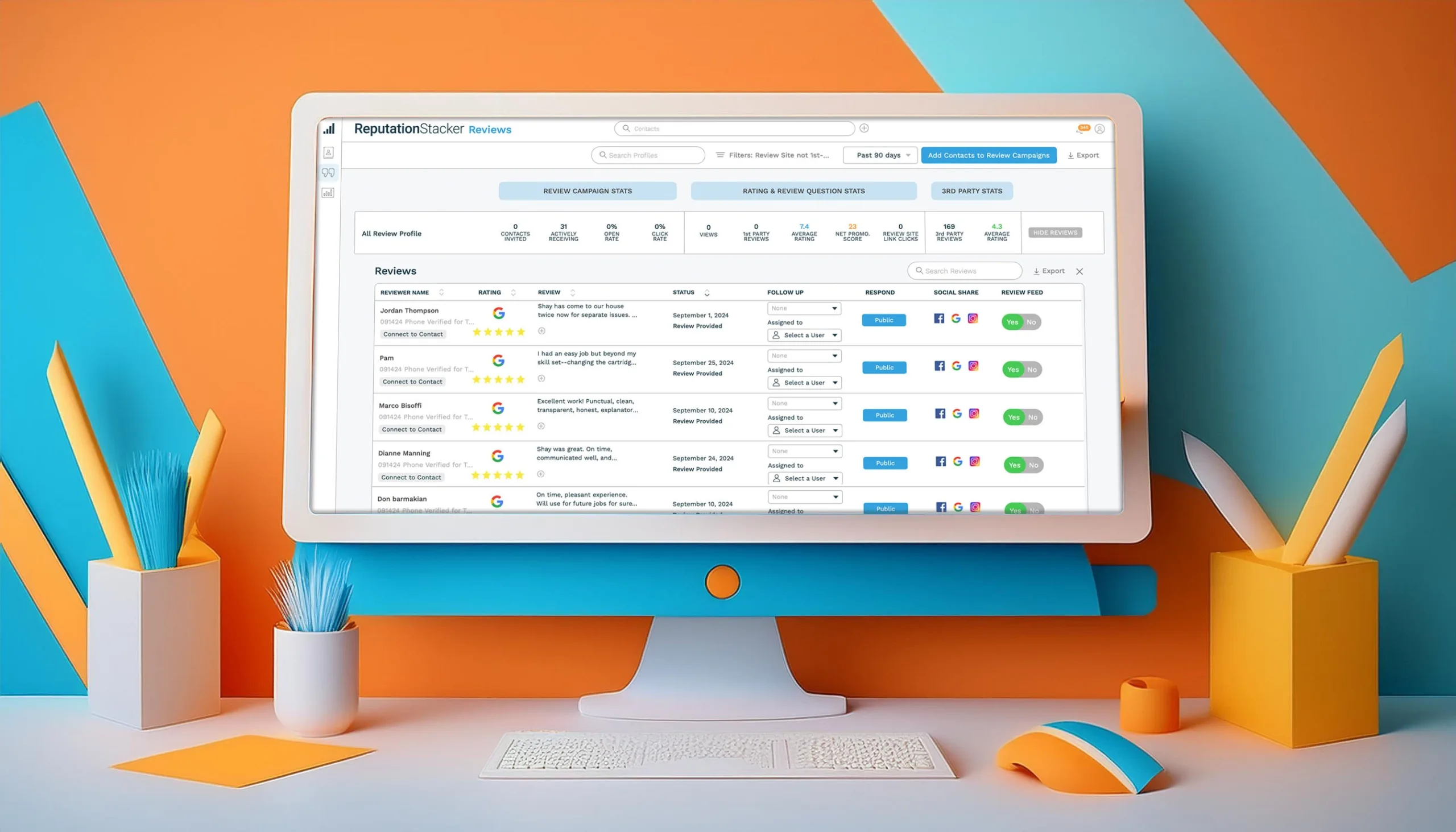Reputation management is one of the most important aspects of running a business in today’s world.
And it involves more than most business owners tend to think.
Aside from providing the best products or services that you possibly can, managing your business reputation includes how your business communicates and interacts with its customers, how it advertises and promotes itself, how it handles negative customer feedback and more.
On the whole, it’s about managing how customers view your business – whether they view it as professional, reliable, caring, and trustworthy, or the opposite.
Managing your business’s brand reputation might sound like a lot to handle, but this guide will break it down for you.
No matter how small or large your business is, we’ll cover the main ways to manage your company reputation.
But first, let’s make sure we’re on the exact same page when it comes to talking about reputation management…
What is Reputation Management?

Reputation management is the process of monitoring, maintaining, and improving an individual’s or organization’s reputation.
These days, managing how the public perceives your business is more critical than ever.
This involves addressing negative feedback, promoting positive content, and making sure that your brand is seen in the best possible light.
Definition of Reputation Management

Reputation management is a strategic approach to managing an individual’s or organization’s reputation by monitoring, analyzing, and influencing public perceptions.
It encompasses a variety of activities, both online and offline, such as getting reviews, social media management, content creation, public relations, and stakeholder engagement.
By actively managing these elements, businesses can shape how they are viewed by their audience, ensuring a positive and trustworthy image.
Importance of Reputation Management

In the digital era, reputation management is indispensable.
Online reviews and social media can significantly impact a business’s success.
A positive reputation helps to build customer loyalty, enhances brand awareness, and ultimately drives revenue growth.
Conversely, a negative reputation can lead to lost business, diminished credibility, and financial setbacks.
Effective reputation management strategies help businesses navigate these challenges, ensuring they maintain a positive online reputation and continue to thrive.
Understanding Company Reputation

Company reputation refers to the collective opinions and perceptions of a company’s stakeholders, including customers, employees, investors, and the general public.
It is influenced by various factors, such as the company’s values, mission, products, services, and interactions with stakeholders.
A strong company reputation is built over time through consistent, positive experiences and effective communication.
Why is Company Reputation Important?

Company reputation is a critical asset that can significantly impact a business’s success.
A positive company reputation can increase consumer trust and customer loyalty, attract top talent, and provide a competitive edge in the market.
It also helps with brand management and customer satisfaction, leading to increased revenue and growth.
On the other hand, a negative company reputation can result in lost business, damaged credibility, and financial losses.
Investing in reputation management strategies is essential for maintaining and improving your company’s online reputation, ensuring long-term success and stability.
Now let’s jump into the specific strategies to manage and improve your company’s reputation.
Hire The Best Staff Possible

Staff are not just the competent workers you hire to fulfill a certain role – they’re also the representatives of your business and its brand values.
This ties in with their passion for what your business offers and how they treat customers, which is important for keeping company reputation to a high standard.
It might be easier said than done, but it’s important to hire staff who share your vision or at least understand your brand’s values.
Understanding your brand values and adhering to them is most important when it comes to improving your business’s customer service, especially if an unsatisfied customer expresses a problem.
So it goes without saying that it’s important to maintain a good relationship with your staff.
This includes keeping them content and happy, and supporting and training them where needed so that they can fulfill their roles to the best of their ability and in line with your company’s values.
Manage Your Online Presence

Your company’s online presence is another important factor that reflects your reputation, simply because the internet is so widely used by your customers.
Managing your online presence effectively will also benefit SEO, boosting your business’s reach and visibility across search engines and social media platforms.
Your business’s online presence includes its website, online reviews, and social media activity – specifically how engaging all your online content is, from the business summary on your homepage to all your social media posts and every online review.
Social media activity not only involves posting content on a regular basis, but also interacting with your customers in a way that’s engaging.
Review management involves not only getting reviews on a steady basis, but also responding quickly to all of your reviews (not just negative reviews), and tracking your reviews so you can stay on top of what your customer are saying about you.
If this sounds like a lot of work, it very well can be. Many companies either hire a reputation management company or use reputation management software to automated these tasks.
Devise Your Marketing Strategy

Marketing strategies, which include ads, logos, campaigns, website design, review collection & responses, and social media content, are also part of managing your business’s reputation.
Marketing often reflects a brand’s products, services and values, so it’s important to put careful thought into how your business markets itself.
Whether you seek help from a marketing manager or not, it’s important to devise and monitor all aspects of your marketing strategy so that these accurately represent what your business is all about – including what it offers customers and the values it upholds or aims to fulfill.
Maintain Good Communication With Customers

Good communication with your customers involves being approachable, timely, helpful, and transparent.
This includes staff friendliness, email communication, customer service help, review responses, and social media interactions.
No matter whether a customer has made a simple inquiry, written a bad review that you need to respond to, or tagged your business in a social media post, it’s important to acknowledge all of your customers equally.
Good communication with customers can not only improve your business’s reputation, but can generate rapport and loyalty.
These are small things that can go a long way, especially if potential customers notice how much your business cares to communicate with its existing customers.
Manage Customer Reviews and Feedback

Last but not least, managing customer reviews.
Customer reviews are arguably the most important factor affecting your business’s reputation, due to how reviews have such a huge influence on prospective customers, SEO rankings, and overall visibility.
Managing your customer reviews involves responding to all customers who post online reviews about your business, as well as actively working to get customers to write reviews, which will help establish your business as an authority and improve your company reputation.
Using online reputation management software can automate getting and managing online reviews.
No matter the review site, you should aim to respond to all customer reviews – both negative and positive reviews.
And if the review is negative, it’s all the more important to reply and try to resolve the customer’s issues promptly.
Needless to say, negative reviews will harm your online reputation, but can be less damaging if you respond quickly, collect a larger majority of positive reviews, and take effective measures to reduce the number of negative reviews you receive.
Build And Manage Your Business Reputation With ReputationStacker

As mentioned, customer reviews are among the most important—if not the most important—ways to manage business reputation.
Reviews often paint an accurate picture of a business’s reputation, with powerful influence over customers and whether or not they decide to use a business.
If you’re a business owner, we don’t have to tell you how hard it is to build your reputation online – let alone collect customer reviews on a consistent basis.
Doing it manually is a slow, tedious process.
But reputation management tools like ReputationStacker solve that problem.
These tools help to generate far more reviews from your own customers than you could get on your own.
ReputationStacker is fully automated so you don’t have to lift a finger.
There are numerous ways to manage your business’s reputation—as listed above—but ReputationStacker handles the most important one for you: getting more reviews.
By simply using ReputationStacker, your company’s reputation won’t just grow quickly, but organically as well.
Frequently Asked Questions About How To Manage A Company’s Reputation
What is reputation management?
Reputation management is the practice of influencing and controlling how a brand is perceived by its stakeholders, including customers, employees, and the media.
Why is online reputation management important for businesses?
Online reputation management (ORM) is crucial because a company’s online image can significantly impact customer trust, sales, and overall brand perception.
What is a reputation management strategy?
A reputation management strategy is a comprehensive plan that outlines actions to enhance or protect a business’s reputation over time.
What are examples of effective reputation management strategies?
Effective strategies include monitoring online reviews, engaging with customers on social media, and creating positive content that aligns with the brand’s values.

How do online reviews affect a brand’s reputation?
Online reviews play a vital role in shaping a brand’s reputation, as potential customers often rely on reviews to make informed decisions.
How can businesses manage negative content online?
Businesses can manage negative content by addressing customer concerns promptly, responding to reviews professionally, and promoting positive content.
What role does social media play in reputation management?
Social media is a powerful tool for reputation management, allowing businesses to engage directly with customers and respond to feedback in real-time.
How can local businesses benefit from reputation management?
Local businesses can improve their visibility and customer trust by managing their reputation effectively on review sites and social media platforms. Many local business use reputation management software as an alternative to using a reputation management consultant in order to keep the costs of reputation management affordable.

What is corporate reputation management?
Corporate reputation management involves strategies and practices designed to influence the public perception of a corporation, including its interactions with stakeholders.
How can I measure my business’s reputation?
You can measure your business’s reputation through online reviews, customer satisfaction surveys, and monitoring brand mentions across various platforms. Reputation management software often includes a dashboard to track your most important reputation management metrics.
What is crisis management in reputation management?
Crisis management involves strategies and actions taken to address and mitigate the impact of negative events on a company’s reputation. This is often a specific focus of reputation management in public relations.
How does customer satisfaction relate to brand reputation?
High customer satisfaction typically leads to positive reviews and a stronger brand reputation, while dissatisfaction can result in negative feedback.

What tools can help with reputation management?
Reputation management software like ReputationStacker can help monitor online mentions, manage reviews, get more reviews, and analyze public sentiment surrounding your brand.
How can businesses earn a positive brand image?
Businesses can earn a positive brand image by delivering excellent customer service, getting a steady stream of positive online reviews, engaging with customers on social media, and promoting positive content.
What is the role of search engine optimization (SEO) in reputation management?
SEO can improve a company’s visibility in search results, ensuring that positive content ranks higher than negative reviews or articles. Reputation management for SEO is growing field that many local businesses are taking advantage of.
What are the benefits of a good reputation for a business?
A good reputation helps to build consumer trust, attracts potential customers, improves brand loyalty, and can lead to increased sales and growth.

How can a reputation management firm assist my business?
A reputation management firm can provide expertise in monitoring brand mentions, managing reviews, and developing effective reputation management strategies. However, due to the high cost of reputation management firms, many small businesses are instead opting to use automated reputation management tools, which perform many of the same functions for a fraction of the price.
Why is it essential to monitor social media for reputation management?
Monitoring social media helps businesses stay informed about customer sentiment, engage with their audience, and address potential issues before they escalate.
How can a business build trust with its target audience?
A business can build trust with its target audience by maintaining transparency, addressing customer issues promptly, and consistently delivering quality products or services.

